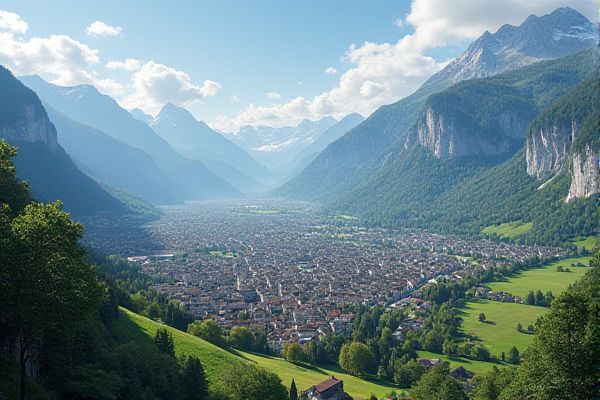
Housing market and best cities to live in Switzerland: Zurich: Financial hub. Geneva: International organizations. Basel: Cultural attractions. Bern: Government seat. Lausanne: Educational institutions. Lucerne: Tourist destination. Winterthur: Innovation hub. Housing costs: High. Property taxes: Vary by canton. Housing demand: Competitive market.
Zurich: Financial hub
Zurich, renowned as Switzerland's Financial Hub, offers a high quality of life characterized by a strong economy, excellent infrastructure, and a robust job market. Despite these advantages, it stands as one of the most expensive cities globally, particularly regarding housing costs. For more detailed insights into what living in Zurich entails, consider visiting the Blueground Blog where you can explore more about this dynamic city.
Geneva: International organizations
Geneva, home to numerous international organizations such as the Red Cross, WTO, WHO, and ILO, has the most expensive owner-occupied apartments in Switzerland, with an average transaction price of CHF 20,130 per sq. m, and rental yields ranging from 2.25% to 2.76%. Despite its high costs, Geneva is ranked among the most liveable cities globally, known for its diplomatic and financial significance. For more detailed insights, visit the Global Property Guide.
Basel: Cultural attractions
Basel is renowned as the cultural capital of Switzerland, boasting the highest density of museums, including the Kunstmuseum Basel and the Museum Tinguely, and hosting the prestigious Art Basel fair. The city's rich cultural scene, combined with its scenic Rhine River banks, historic Old Town, and numerous parks and gardens, make it an attractive and culturally vibrant place to live.
Bern: Government seat
Bern, the Government Seat Of Switzerland, is highlighted for its rich history and culture, though it is not as frequently mentioned as other cities like Geneva, Zurich, and Lausanne in terms of expat preferences. However, Bern offers a high quality of life, a low crime rate, and excellent public transportation, making it an attractive option for those looking for a stable and comfortable living environment.
Lausanne: Educational institutions
Lausanne is home to the University of Lausanne (UNIL), founded in 1537, which is one of the oldest continuously operating universities in the world. The university comprises seven faculties and is known for its diverse curriculum, international student body, and modern campus facilities alongside the Swiss Federal Institute of Technology in Lausanne (EPFL). For more detailed information about this prestigious institution, you can visit the University of Lausanne page.
Lucerne: Tourist destination
Lucerne, a prominent tourist destination in central Switzerland, has been shaped significantly by its tourism industry over the past two centuries. The city's physical appearance, residents' self-awareness, and overall identity have been influenced by tourism, leading to debates about overtourism and the city's capacity to manage increasing visitor numbers. For more in-depth information on how this industry has evolved and impacted Lucerne, you can refer to the comprehensive resource available on Serval UNIL.
Winterthur: Innovation hub
Winterthur, while not specifically highlighted as an innovation hub in the provided sources, is mentioned as one of the top cities for expats in Switzerland due to its location and connections to major European cities. It offers a high standard of living and excellent public transportation. For more information, you can check out the Best Places to Live in Switzerland to explore other cities that might suit your lifestyle needs.
Housing costs: High
The Swiss housing market has experienced a remarkable increase in prices, with the average cost of a home rising by 117% between 2003 and 2023. This surge has been driven by high demand, low interest rates, and stringent building regulations, especially in urban areas such as Geneva and Zurich. In these cities, prices per square meter have soared to 14,290 CHF and 13,490 CHF, respectively. For more insights on this phenomenon, the Swiss Housing Market provides comprehensive details.
Property taxes: Vary by canton
Property taxes in Switzerland vary significantly by canton, with areas like the Cantons of Schwyz and Zug offering some of the most favorable tax benefits, particularly appealing to high-income earners and wealthy individuals. Meanwhile, regions around Lake Geneva tend to have higher fiscal burdens. For more insights on the best cities and their property prices, you can explore the Properstar Real Estate Guides And Advice.
Housing demand: Competitive market
The Swiss housing market is highly competitive, particularly in cities like Zurich, Geneva, and Basel, where demand significantly outstrips supply, driving up prices and making affordable housing challenging to find. For those seeking alternatives, cities like Bern, St. Gallen, and Biel offer more affordable options but still face moderate to high demand due to their unique local attractions and economic drivers. For a comprehensive understanding of these dynamics, check out how the [Swiss Housing Market](https://www.zweers-include.com/post/navigating-the-challenges-of-house-hunting-in-switzerland-s-major-cities) navigates these complex challenges in its major urban centers.
